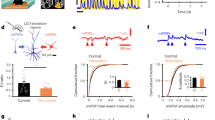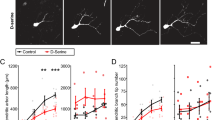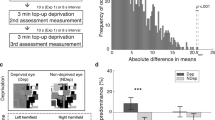Abstract
Abundant evidence now indicates that atypical visual exposure early in the life of cats and primates can cause profound alterations in cortical organization1. In particular, it has been shown that preventing the use of one eye for vision early in life results in a marked shift of ocular preference among neurones of kitten visual cortex in favour of the exposed eye1–3. The cellular mechanisms underlying these alterations remain uncertain, but much recent attention has focused on the possible role of pharmacological agents in modifying cortical plasticity, with particular reference to catecholamines. These experiments, which have shown that agents which modify cortical nonadrenaline levels can alter the degree of cortical plasticity4–7, do not specify the mechanism of action, and leave open the possibility that other neurotransmitter systems may also be involved in cortical modifiability. We now report that chronic intracortical administration of L-glutamate during a period of monocular vision imposed on young kittens largely prevents the ocular dominance shift which normally occurs under these circumstances.
This is a preview of subscription content, access via your institution
Access options
Subscribe to this journal
Receive 51 print issues and online access
$199.00 per year
only $3.90 per issue
Buy this article
- Purchase on Springer Link
- Instant access to full article PDF
Prices may be subject to local taxes which are calculated during checkout
Similar content being viewed by others
References
Movshon, J. A. & Van Sluyters, R. C. A. Rev. Psychol. 32, 477–522 (1981).
Hubel, D. H., Wiesel, T. N. & Levay, S. Phil. Trans. R. Soc. B278, 131–163 (1977).
Hubel, D. H. & Wiesel, T. N. J. Physiol., Lond. 206, 419–436 (1970).
Kasamatsu, T. & Pettigrew, J. D. J. comp. Neurol. 185, 139–161 (1979).
Kasamatsu, T., Pettigrew, J. D. & Ary, M. J. comp. Neurol. 185, 163–181 (1979).
Daw, N., Rader, R. K. & Robertson, T. W. Soc. Neurosci. Abstr. 7, 673 (1981).
Daniels, J. D., Ellis, M. K., Bianco, S. A., Garrett, M., Nelson, S. B. & Schwartz, M. Soc. Neurosci. Abstr. 7, 673 (1981).
Shaw, C. & Cynader, M. Soc. Neurosci. Abstr. 7, 722 (1981).
Hess, R. & Murata, K. Expl. Brain Res. 21, 285–297 (1974).
Cynader, M., Berman, N. & Hein, A. Expl Brain Res. 25, 139–156 (1976).
Hess, R., Negishi, K. & Creutzfeldt, O. Expl Brain Res. 22, 415–419 (1975).
Van Harreveld, A. & Fifkova, E. Expl molec. Path. 15, 61–81 (1971).
Wong-Riley, M. Brain Res. 171, 11–28 (1979).
Thieffry, M., Bruner, J. & Personne, P. J. Physiol., Paris 75, 635–639 (1979).
Woodward, D. J., Moises, H. C., Waterhouse, B. D., Hoffer, B. J. & Freedman, R. Fedn Proc. 38, 2109–2116.
Reader, T. A. Experientia 34, 1586–1587 (1978).
Reader, T. A., Ferron, A., Descarries, L. & Jasper, H. H. Brain Res. 160, 217–229 (1979).
Kasamatsu, T. & Heggelund, P. Expl Brain Res. 45, 317–327 (1982).
Hubel, D. H. & Wiesel, T. N. J. Physiol., Lond. 160, 106–154 (1962).
Author information
Authors and Affiliations
Rights and permissions
About this article
Cite this article
Shaw, C., Cynader, M. Disruption of cortical activity prevents ocular dominance changes in monocularly deprived kittens. Nature 308, 731–734 (1984). https://doi.org/10.1038/308731a0
Received:
Accepted:
Issue Date:
DOI: https://doi.org/10.1038/308731a0
This article is cited by
-
Critical period plasticity in local cortical circuits
Nature Reviews Neuroscience (2005)
Comments
By submitting a comment you agree to abide by our Terms and Community Guidelines. If you find something abusive or that does not comply with our terms or guidelines please flag it as inappropriate.



